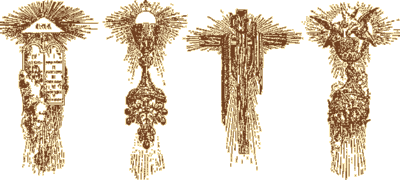Alone but not Lonely: The Solas of Theology

The Lutheran Reformation: Restoration, not Reinvention
Since I write as a Lutheran, I like to pause once in a while to sum up portions of our theology or history. Since the Reformation began on 31 October 1517, I often devote a column near this time of year to expressing something that makes our confession unique.
In line with Holy Scripture, the Lutheran Church confesses that we are saved by grace through faith in Christ. Solely in the revealed Word of God do we discover that God saves us only by His grace, only through faith in Christ alone, as expressed in Romans 1:17, “The righteous shall live by faith.” Likewise, Ephesians 2:8-9 says, “By grace you have been saved through faith. And this is not your own doing; it is the gift of God, not a result of works, so that no one may boast.” Based on such truth, our theologians made various expressions in order to clarify that human works play absolutely no part in our salvation.
Our Lutheran forefathers were not innovators: They aligned themselves with earlier generations who confessed the fullness of God’s saving work in Christ, denying any authoritative word outside of Scripture, and relying solely upon God’s grace and Spirit-created faith to be forgiven, justified, and at peace with the Father. It’s worth reviewing a bit of what Christians through the ages have said and believed about what came to be known as the “solas” of Reformation Christianity.
Sola Scriptura (Scripture Alone)
“Regarding the things I say, I should supply even the proofs, so I will not seem to rely on my own opinions, but rather, prove them with Scripture, so that the matter will remain certain and steadfast. (John Chrysostom)”
“We are not content simply because this is the tradition of the Fathers. What is important is that the Fathers followed the meaning of the Scripture. (Basil the Great)”
“The holy and inspired Scriptures are fully sufficient for the proclamation of the truth. (Athanasius)”
Sola Gratia (Grace Alone)
“After speaking of the wages of sin, in the case of blessings, he has not kept to the same order: for [Paul] does not say, the wages of your good deeds, but the gift of God: to show, that it was not of themselves that they were freed, nor was it a due they received, neither yet a return, nor a recompense of labors, but by grace all these things came about. (Chrysostom)”
“Let no man glory in works, for by his works no man shall be justified, for he that is just hath a free gift.... (Ambrose)”
Sola Fide (Faith Alone)
“We ... are not justified by ourselves, or our own wisdom or understanding or godliness, nor by such deeds as we have done in holiness of heart, but by that faith through which Almighty God has justified all men since the beginning of time. (Clement of Rome)”
“Human beings can be saved from the ancient serpent in no other way than by believing in Him who, when He was raised up from the earth on the tree of martyrdom in the likeness of sinful flesh, drew all things to Himself and gave life to the dead. (Irenaeus)”
“They said that he who adhered to faith alone was cursed; but he, Paul, shows that he who adhered to faith alone is blessed. (Chrysostom)”
Solus Christus (Christ Alone)
“Take therefore first, as an indestructible foundation, the Cross, and build upon it the other articles of the faith. (Cyril of Jerusalem)”
“God is a great lover of man. He did not hesitate to surrender His Son as prey in order to spare His servant. He surrendered His only-begotten to purchase hard-hearted servants. He paid the blood of His Son as the price. O the philanthropy of the Master! And do not tell me again, ‘I sinned a lot; how can I be saved?’ You cannot save yourself, but your Master can, and to such a great degree as to obliterate your sins.... He wipes out the sins so completely that not a single trace of them remains. (Chrysostom)”
Conclusion
The Lutheran Reformation begat no novelties but was grounded in and returned to the confession of the early Christian Church. Lutheranism is no “lonely” voice, speaking a foreign language among Christ’s people. By confessing Christ alone, faith alone, grace alone, and Scripture alone, we stand among the faithful and orthodox “cloud of witnesses” as we “run with endurance the race that is set before us. (Hebrews 12:1)” True Lutherans of this day continue to believe and confess these ancient truths. In general, these solas form the bedrock of Lutheran theology; in particular, they show the presuppositions this writer will always hold as he answers questions on Scripture, faith, and life.
In keeping with this, and in closing today’s column, I offer one final “lone” statement, used by Lutheran composer and theologian Johann Sebastian Bach: “Soli deo gloria — to God alone the glory!” For only when we confess Christ alone, Scripture alone, faith alone, and grace alone, do we rightly glorify Him who sent His Son to die for our sins.
Scripture quoted from The Holy Bible, English Standard Version™, © 2001 by Crossway Bibles.
Quotes from the Church fathers are in the public domain.
Send email to Ask the Pastor.
Walter Snyder is the pastor of Holy Cross Lutheran Church, Emma, Missouri and coauthor of the book What Do Lutherans Believe.

1 Comments:
It is terribly important that we understand the grammar of the solas.
The case of all of them except one is ablative. Solus Christus is nominative.
So properly translated the Solas are:
Christ alone,
by Scripture alone
by Faith alone
by Grace alone
If we don't express it like that, it's all bad. Scripture alone, faith alone, and grace alone are all worthless without Christ alone.
Post a Comment
<< Home